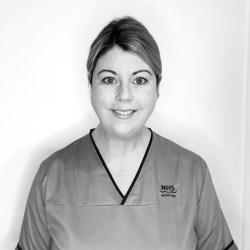Career paths in healthcare: nursing alumni tell their stories
Across the UK and around the globe, our nursing alumni are making a difference to patient care every day. Here we share the stories of three individuals: Nikki Stephen, Rebecca Moralee, and Sean King.
Nikki Stephen graduated with a BN Nursing in 2021 and is currently a Community Nurse Practitioner with Craiglockhart Medical Group.

“Moving from the acute sector to community nursing has allowed me to face many different situations and challenges I hadn’t experienced before. One of the areas that has had a big impact on me is caring for end-of-life patients. I feel extremely proud to offer care and support to patients and relatives at such an emotional and significant moment in their lives. And having learnt how to cope in these situations, I enjoy sharing my knowledge and experience with other members of staff and nursing students.
Community nursing requires a high level of decision making and clinical judgement to ensure that patient health needs are met effectively. It involves me in providing specialist advice to other healthcare professionals, as well as patients and their relatives.
What I enjoy so much is the opportunity to make a difference to people’s lives. It is an extremely rewarding job, though it can be very difficult at times, but to go home at the end of a busy shift, knowing you’ve done your very best for your patients and their relatives, makes all the hard work worth it. I love my role within nursing and feel extremely privileged to be part of my caring team.
Rebecca Moralee is a Clinical Application Specialist for medical devices company Mindray. She graduated in 2010 with a BN Nursing (Adult).

“I am passionate about improving patient outcomes, enhancing user experience, and advancing healthcare innovation. Initially, I found the transition from clinical nursing to industry quite a steep learning curve, but a big benefit of working for global companies is the exposure to different healthcare systems and products, and there are lots of new opportunities. Making the leap into industry has exposed me to new ways of thinking.
I’ve worked with diverse and multidisciplinary teams and have travelled across Europe supporting surgeons; I even worked in Qatar for a year, which was a really interesting experience. I feel it’s such a privilege to support healthcare staff to utilise technology that can make a difference to them and helps patient safety. I love contributing to the delivery of high-quality care, education, and consultancy.
When I first qualified, I was doubtful of my abilities, and I used to hold myself back. Slowly, I gained confidence and the awareness that we are more capable than we realise. For me, studying nursing at Edinburgh Napier completely changed the course of my life – I’d previously been working in finance. More recently, I completed a Master of Business Administration in Healthcare at the University, and I’ve undertaken various other professional qualifications throughout my career. The challenges of my work make it always feel new. If you’re willing to learn and try things, there are so many opportunities out there.”
Sean King is a PCI Clinical Nurse Specialist in the world-renowned Essex Cardiothoracic Centre (CTC) within Mid and South Essex NHS Foundation Trust. He graduated in 2014.

“The scope of nursing is vast and so varied that there’s a role for everyone within it, and I think it’s about finding what you feel passionate about. As a percutaneous coronary intervention (PCI) nurse specialist, working within the world-renowned Essex Cardiothoracic Centre (CTC), I’m part of a three-nurse team which delivers a wide array of care to patients who have undergone complex percutaneous coronary procedures, taking responsibility for their on-going clinical management.
Back as a Band 5 ward nurse, I thought that would be my career, but then you discover there are all these possibilities and pathways. When I worked within an acute receiving unit at Western General, Edinburgh, I was seeing patients with various heart conditions, looking at ECGs, and finding it all fascinating, and that started my interest in cardiology. Now, I sometimes I step back for a moment and think ‘Wow, I’ve come so far!’.
What’s so great about nursing is the range of people who enter it; it’s a multicultural, diverse, and inclusive workforce and I still find that so rewarding to be part of. Plus, you grow every day; you are continually building your knowledge and understanding. In 2020 I was redeployed to A&E due to the COVID-19 pandemic and what a learning curve that was. It was the most significant experience of my career, and I rejoined cardiology two or so years later with many new skills.
I’ve continued to undertake further qualifications, for example a Master’s in Advanced Clinical Practice and the RCUK Advanced Life Support course, and I also teach at the local university – I so enjoy interacting with the next generation of nurses coming through.”